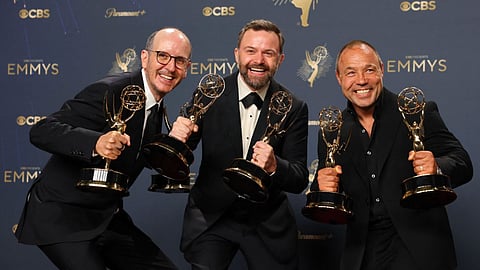What the 77th Emmys Really Meant for Television’s Future
The Golden Theater, the Glittering Night
Los Angeles shimmered last night as the 77th Primetime Emmy Awards unfolded at the Peacock Theater. Television’s brightest stars paraded the crimson carpet, but beyond couture gowns and diamond‑drenched tuxedos, the night carried a weight that reflected seismic shifts in storytelling, representation, and power. The Emmy stage has always been a mirror of Hollywood’s state of play—this year it felt more like a crystal ball.
Prestige Drama Meets a New Pulse
The big drama prize went to The Pitt, HBO Max’s brooding medical saga. Longtime TV favorite Noah Wyle, a name forever linked to ER, took home his first Emmy for Lead Actor in a Drama Series—three decades into his career. It was a reminder that the small screen remains the crucible where actors can reinvent themselves.
Meanwhile, Apple TV+’s Severance walked into the ceremony as the night’s most nominated contender with 27 nods. Though it lost the drama crown, it still racked up major wins, including Britt Lower’s electric turn as Lead Actress and Tramell Tillman’s Supporting Actor victory—making him the first Black actor ever to win in that category. In a city that often talks about inclusion more than it delivers it, Tillman’s moment landed with palpable weight.
Comedy Rewritten—With Bite
If drama reflected gravitas, comedy roared with reinvention. The Studio, Apple TV+'s gleefully cutting satire of Hollywood itself, claimed Outstanding Comedy Series in its debut season. The show’s breakout star Seth Rogen collected four Emmys, including Lead Actor in a Comedy, cementing his transformation from big‑screen funnyman to small‑screen satirist.
And then there was Jean Smart—television’s grande dame—who once again proved untouchable, winning Best Actress in a Comedy for Hacks. Sharing the spotlight, Hannah Einbinder picked up her first Emmy for Supporting Actress, but it was her speech that ignited headlines. “Free Palestine,” she said, alongside other messages of solidarity. In an era where stars curate every public word, Einbinder’s raw, unscripted moment echoed like a thunderclap..
Youth Breaks the Mold
In a night already rich with milestones, one stood apart: Owen Cooper, just 15, became the youngest male actor in Emmy history to win for his performance in Netflix’s Adolescence. Draped in oversized tuxedo sleeves and wide‑eyed astonishment, Cooper turned a rite of passage into a generational statement. Television, often accused of playing safe, is giving space to stories told through younger voices—and rewarding them.
Farewells and Full‑Circle Moments
The night’s tears belonged to Stephen Colbert. His long‑running Late Show may have been cancelled, but the Emmys crowned it Best Talk Series one final time. Standing ovation, damp eyes, and a reminder that endings can still be triumphant. Colbert’s win symbolized how television is as much about legacy as it is about innovation.
Television’s Next Act
Taken together, last night’s Emmys felt like a broadcast of television’s next era. Streaming dominance is no longer the twist ending; it’s the opening act. Platforms like Apple TV+, Netflix, and HBO Max have consolidated prestige, giving traditional networks little more than a supporting role.
More importantly, voices previously muted—young, diverse, outspoken—are now shaping the narrative. When a teenager and a veteran, a satirist and a social activist, can all stand on the same stage holding the same golden statue, television is no longer just entertainment. It’s a battleground, a mirror, and at its best, a spark for cultural change.
Inspired by what you read?
Get more stories like this—plus exclusive guides and resident recommendations—delivered to your inbox. Subscribe to our exclusive newsletter
Resident may include affiliate links or sponsored content in our features. These partnerships support our publication and allow us to continue sharing stories and recommendations with our readers.

